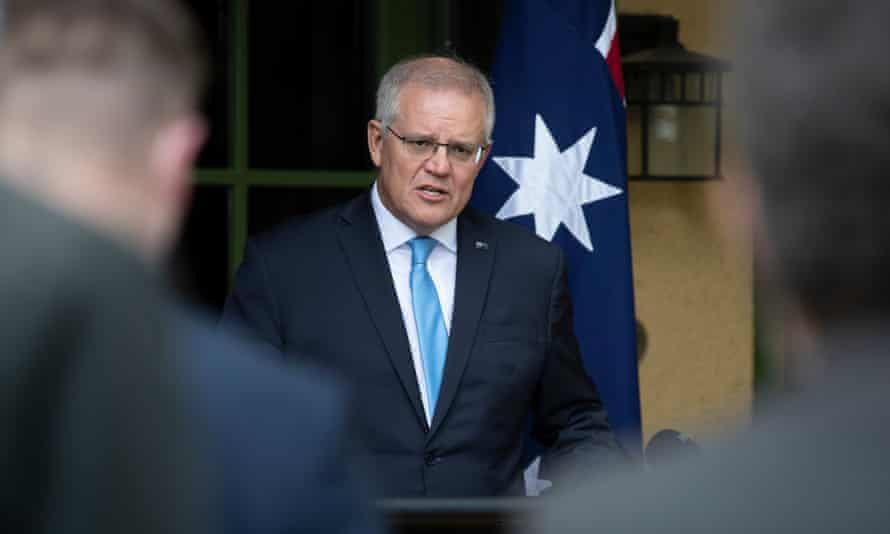Right faction hardheads will accept greenwashing ahead of Glasgow if that’s required to keep the Coalition in power

But even if Scott Morrison lands net zero he would rather market his climate pivot at home rather than abroad – there’s an election to prepare for

Shuffling the ministerial decks is always complicated for prime ministers because noses get put out of joint and orderly habits are disrupted. As Scott Morrison winged his way back from Washington last weekend, the word was the PM would keep his reshuffle surgical.
Morrison obviously had to deal with the hole created by the departure of Christian Porter (who was shifted out of attorney general into the industry portfolio when his position became untenable, and then departed industry after he couldn’t disclose who donated to a trust fund to help pay his legal fees for a defamation case).
Fixing the industry bit of the post-Porter equation was easy: get Angus to do it. “Angus” being Angus Taylor, the minister for energy and emissions reduction. Industry could sit comfortably enough with his other portfolios.
Last weekend, the word was science and technology would be hived off from industry and given to Ben Morton.
Morton is a Morrison protege – the prime minister’s eyes and ears around the government. “The apprentice” (Morrison’s label for Morton) is also a sandgroper, like Porter.
But as the week went on, the speculation shifted. Science wasn’t necessarily a good fit for Morton, who would need to go on being Morrison’s eyes and ears around the government.
Science went to another Western Australian, Melissa Price, and Morton was anointed special minister of state. Special ministers of state are fixers, particularly when elections are in sight. As well as boosting Morton, Morrison also elevated another of his very close allies, Alex Hawke, to the cabinet.
Friday’s reshuffle – shoved out the door at warp speed in the mildly surreal minutes before Gladys Berejiklian resigned as New South Wales premier – carried the distinct sound of circling the wagons, which isn’t necessarily what you’d expect, unless you are paying close attention.
Right now, Morrison is trying to land new climate commitments ahead of the Cop26 in Glasgow. While senior people insist Morrison’s net zero plane is going to land, on a runway, with zero casualties, either in the second or third week of October, climate policy can be lethal territory for Australian prime ministers, and not just prime ministers called Malcolm Turnbull (as Kevin Rudd and Julia Gillard can attest).
Morrison’s current trouble seems to be confined to a handful of Queensland Nationals as opposed to the entire right faction of the Liberal party, which was Turnbull’s cross to bear during rounds one and two of his internal climate wars.
Thus far, the right has been quiet. People say the majority view is grudging acceptance because of the shifting politics – although some conservatives report a growing backlash bubbling up from the base about a net zero commitment.
Morrison referenced the shifting politics when he met a deputation of mainly moderate Liberals earlier this week. This group of MPs was given some face time with Morrison after they asked to see him. The objective was to send a clear message: the group wanted a commitment to the net zero target. They did not want a handful of Queensland Nationals writing the government’s climate change policy.
At one point during the meeting, Morrison told the group he understood climate action was now a vote-changing issue, and not only in the seats of the people arrayed before him on the video call. To decode this observation, we need to understand the electoral dynamics of 2019. Climate change was certainly a headache for Liberals in a handful of safe city seats where the margins were sufficient to protect incumbents from incursions by independents. But the government’s unconscionable policy record wasn’t a problem for the Coalition electorally across the board.
Morrison evidently thinks things have shifted (and this is a prime minister who researches propositions intensively). If the centre of political gravity has shifted in favour of climate action in parts of the country where the Liberals need to hold or win seats, then the Liberal party will need to act, or (more pertinently) at least look like it’s acting.
If that’s the electoral reality, political hard heads in the right faction of the Liberal party can hold their noses about net zero if they believe greenwashing ahead of Glasgow is what’s required to keep Labor out of power.
But for some hardcore conservatives, Morrison revisiting the Coalition’s climate crime scene will be a provocation. It will be yet more proof of his obnoxious dictatorial pragmatism. It is not clear yet whether or not conservative feet will be stamped or rhetorical punches thrown. Perhaps they won’t, because there are always consequences for picking fights. But wise prime ministers prepare for all contingencies.
So there’s climate to land. There’s also an election to prepare for.
Morrison is as focused on the latter as he is on the former. One current litmus test of this is Glasgow, and whether or not the prime minister is prepared to front the Cop26 conference. Perhaps Morrison will attend. But the vibe the prime minister is sending at the moment is he’s unlikely to go, even to front his own climate pivot.
The reason for Morrison’s reluctance is obvious. Jet setting in the age of Covid requires periods in quarantine that are unhelpful for domestic visibility. Assuming the prime minister can land his net zero deal with Barnaby Joyce, Morrison would rather market his climate pivot at home rather than abroad.
Given the federal election will be under way some time over the next six months, Morrison’s prime ministership is absolutely on the clock. Polls have Labor in front. Perhaps the surveys are all wrong. They were in 2019 – largely because polls in the modern era can be surveys of the politically engaged rather than disengaged voters who swing elections. But if the polls are correct, the government has to make up ground.
New South Wales is an important state for Morrison, and the premier has just walked after the state’s anti-corruption watchdog revealed it was investigating whether she broke the law by failing to report the conduct of her ex-lover, the former Wagga Wagga MP Daryl Maguire.
That means Australia’s largest state is about to change leaders just as we transit from pandemic to endemic – with all the risks and unknowns that entails. All the states are seeking increased funding for their hospitals to manage the coming surge. The unknowns of this transition would be another reason not to be in Glasgow.
Morrison evidently judges that Australians in the lockdown states are ready for freedom, even if freedom necessitates an increase in personal risk. The prime minister wants to validate that sentiment. Friday was supposed to be dominated by news that international travel would resume in November, but the hijinks in NSW swallowed that bauble whole.
To state the obvious: a lot of what’s going to happen over the next few months is out of the prime minister’s control. You might have a message plan, but events have a nasty habit of overtaking it.
While we are on statements of the obvious, here’s another one: Peter Dutton is very quiet, and Josh Frydenberg is very visible.
I have absolutely no reason to think there is any trouble brewing. But looping back to where we started, with Friday, and that reshuffle – if I were Morrison, dealing with all these moving parts, I’d want my friends close too.